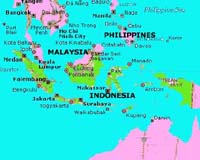| . |  |
. |
Riyadh (AFP) Sept 21, 2009 Boasting one of the fastest supercomputers in the world, a team of top scientists and a campus where female and male students can mingle freely, Saudi Arabia's new multi-billion dollar university aims to break both scientific and social barriers. Officially the goal of this week's launch of the sprawling new facility is to propel the kingdom into the heady global ranks of technological research. But with women on campus not having to shroud themselves in the black abaya and allowed to drive cars, an unstated aim is to chip away at the strict restrictions on Saudi women imposed by hardline Muslim clerics. On Wednesday the monarch, in a keystone of his attempts to power his country into the 21st century, will open the King Abdullah University of Science and Technology -- KAUST -- probably the only postgraduate research university ever built from scratch. Both the ambition and the billions of dollars thrown at the project have sparked deep interest in the global science community. In just three years the Saudis have constructed a high-tech campus of huge modernist buildings on a 36-square-kilometre (14-square-mile) desert plot on the Red Sea coast, and recruited hundreds of scientists and students from around the world. KAUST has already launched joint research programmes with institutions ranging from the National University of Singapore to France's Institut Francais du Petrole to Britain's Cambridge and Stanford in the United States. And it has created its own research operations spanning nanotechnology, applied mathematics, solar energy, membrane research and bioengineering. "Two years ago it was nothing but sand and sea. Today there is one of the best infrastructures for research," KAUST president Choon Fong Shih told AFP. Classes, all taught in English, opened in September at the campus 80 kilometres (50 miles) north of Jeddah, with 71 professors and 374 post-graduate students. The masters and doctorate degree students represent more than 60 countries, with some 15 percent from Saudi Arabia itself. The Saudis drew on top-calibre scientists and science educators, especially in the United States, to spur the recruitment process. Shih himself is an example. The lauded research engineer helped turn the National University of Singapore into a respected research institution over the past decade. KAUST's success will ultimately depend on world-class research and the results being published in top journals, said Edward Derrick, who directs the research competitiveness programme at the American Association for the Advancement of Science. "Universities compete for resources, for prestige. You want your students to be published in the best journals," he said. Money for research is the key, said Fawwaz Ulaby, a US-based engineering professor who served as KAUST provost during the start-up period. "The single most important component probably is that... the amount of resources able to fund research worldwide does not meet demand," he said. That gives oil-rich Saudi Arabia an advantage. KAUST reportedly has a 10-billion-dollar endowment to fund research, and it has spent aggressively on salaries and scholarships. Some professors were offered 90,000-dollar annual salaries tax-free plus all expenses for themselves and their families. Students also receive generous stipends, and some had their last year of university elsewhere paid for. The freedom of the academic environment will also be crucial, Ulaby said. That will perhaps be harder in Saudi Arabia, where science in public schools takes a back seat to religion, with bureaucrats loath to cede power and women facing many restrictions. With about 15 percent of the incoming student body women, all having studied at universities outside the kingdom, mixing is absolutely necessary for successful research, experts say. People involved in KAUST's development say Abdullah hopes its culture will eventually spill outside the campus gates, where women are banned from driving, must be accompanied by a male relative outside the home and have to wear an abaya. Some restrictions are evident inside, however. Male students report that they are banned from entering women's residences at KAUST. And hardline clerics are already battling the "anything goes" ethos inside other foreign compounds. In June the religious police cracked down on a limited access residential and resort community north of Jeddah -- not far from KAUST -- where men and women mixed with relative openness and women had been seen driving. Share This Article With Planet Earth
Related Links All About Human Beings and How We Got To Be Here
 Indonesian rights groups condemn new stoning law
Indonesian rights groups condemn new stoning lawBanda Aceh (AFP) Sept 15, 2009 Indonesian rights activists Tuesday condemned as "cruel and degrading" a new Islamic law calling for adulterers to be stoned to death in the country's staunchly conservative Aceh province. The law -- which also allows punishments of up to 400 lashes for child rape, 100 lashes for homosexual acts and 60 lashes for gambling -- was passed unanimously Monday by lawmakers in the region at Sumatra ... read more |
|
| The content herein, unless otherwise known to be public domain, are Copyright 1995-2009 - SpaceDaily. AFP and UPI Wire Stories are copyright Agence France-Presse and United Press International. ESA Portal Reports are copyright European Space Agency. All NASA sourced material is public domain. Additional copyrights may apply in whole or part to other bona fide parties. Advertising does not imply endorsement,agreement or approval of any opinions, statements or information provided by SpaceDaily on any Web page published or hosted by SpaceDaily. Privacy Statement |